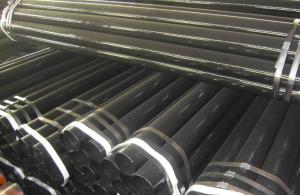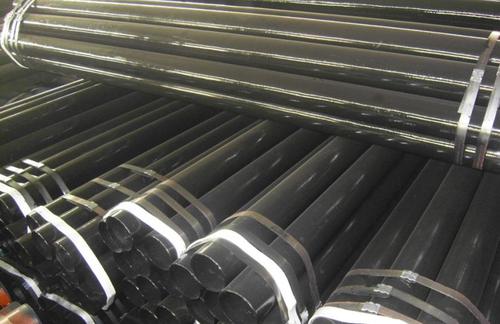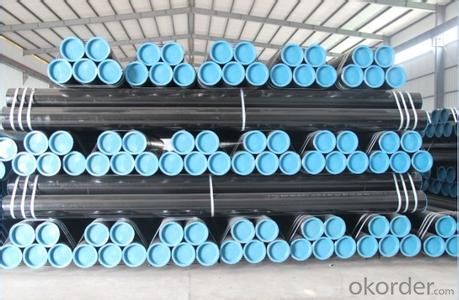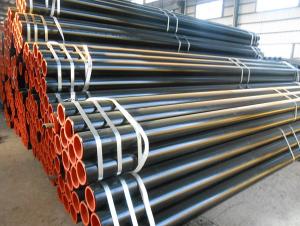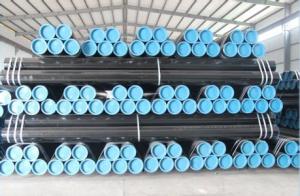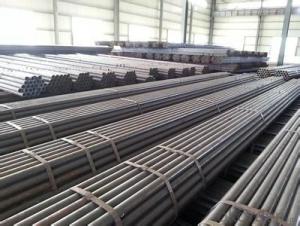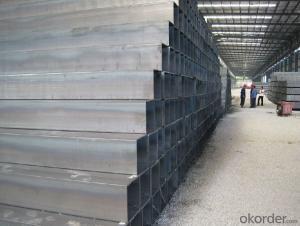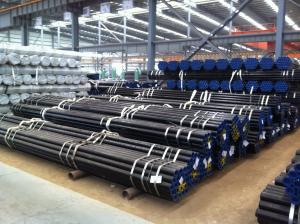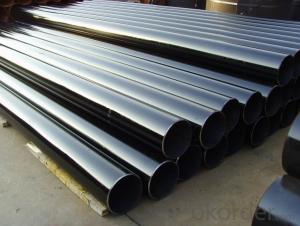Black Carbon Seamless Steel Pipe of API 5L
- Loading Port:
- China Main Port
- Payment Terms:
- TT or LC
- Min Order Qty:
- 25 m.t.
- Supply Capability:
- 1000 m.t./month
OKorder Service Pledge
OKorder Financial Service
You Might Also Like
Product Description:
1、Structure of Black Carbon Seamless Steel Pipe of API 5L Description:
Seamless pipe is formed by drawing a solid billet over a piercing rod to create the hollow shell. As the manufacturing process does not include any welding, seamless pipes are perceived to be stronger and more reliable. Historically seamless pipe was regarded as withstanding pressure better than other types, and was often more easily available than welded pipe.
2、Main Features of Black Carbon Seamless Steel Pipe of API 5L:
• High manufacturing accuracy
• High strength
• Small inertia resistance
• Strong heat dissipation ability
• Good visual effect
• Reasonable price
3、Black Carbon Seamless Steel Pipe of API 5L Images:
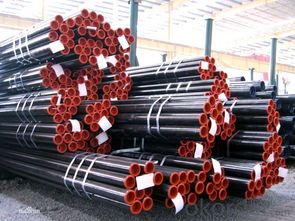
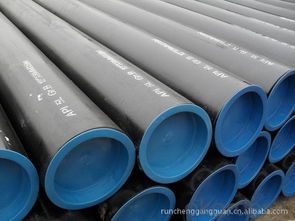
4、Black Carbon Seamless Steel Pipe of API 5L Specification:
1. Commodity Name: Seamless steel pipe
2. Standard: API,GB,ASTM,ASME,DIN
3. Quality grade: 10#, 20#, A106B, A53B, API 5L B, Q235, Q345, ST37-2, ST 45, ST52.etc.
4. Dimension:
OD: 1/2"-24"
WT: 2.5-80mm, SCH10~SCH40~XXL
length: 5.8m,6m,8m,9m,12m
5. Technique: Hot Rolled/Cold Rolled/ Cold Drawn
6. application
carbon seamless steel pipes are widely used in gas, water and oil, transpotation;constructions;Bridge,highway,windows of model steel door; building materials;fences;heating facilities Fluid Pipe;conduit pipe,scaffolding pipe.etc.
7. Payment Terms: L/C D/A D/P T/T
5、FAQ of Black Carbon Seamless Steel Pipe of API 5L:
①How is the quality of your products?
Our products are manufactured strictly according to national and internaional standard, and we take a test
on every pipe before delivered out. If you want see our quality certifications and all kinds of testing report, please just ask us for it.
Guaranteed: If products’ quality don’t accord to discription as we give or the promise before you place order, we promise 100% refund.
②How about price?
Yes, we are factory and be able to give you lowest price below market one, and we have a policy that “ for saving time and absolutely honest business attitude, we quote as lowest as possible for any customer, and discount can be given according to quantity”,if you like bargain and factory price is not low enough as you think, just don’t waste your time.Please trust the quotation we would give you, it is professional one.
③Why should you chose us?
Chose happens because of quality, then price, We can give you both.Additionally, we can also offer professional products inquiry, products knowledge train(for agents), smooth goods delivery, exellent customer solution proposals.Our service formula: good quality+good price+good service=customer’s trust
SGS test is available, customer inspection before shipping is welcome, third party inspection is no problem.
Any question, pls feel free to contact us !
- Q: How do steel pipes handle ground settlement?
- Steel pipes are generally robust and durable, making them well-suited for handling ground settlement. The flexibility and strength of steel allow the pipes to withstand the shifting and settling of the ground without significant damage. Steel pipes have a high resistance to deformation, which means they can maintain their shape and structural integrity even when the ground settles or moves. When the ground settles, steel pipes can accommodate the movement by flexing and bending slightly. This flexibility allows them to adjust to changes in the ground without breaking or cracking. Additionally, steel pipes are often designed with joints that can absorb and distribute stress caused by ground settlement. Furthermore, steel pipes have a smooth interior surface that minimizes friction and resistance to the flow of materials. This feature is particularly important when the ground settles because it reduces the likelihood of clogs or blockages due to debris or sediment settling in the pipes. In summary, steel pipes are well-equipped to handle ground settlement due to their strength, flexibility, and resistance to deformation. They can adapt to the movement of the ground without compromising their structural integrity, making them a reliable choice for various applications, including underground infrastructure and pipeline systems.
- Q: How are steel pipes used in the agricultural sector?
- Steel pipes are commonly used in the agricultural sector for various purposes such as irrigation systems, water supply lines, and drainage systems. They are used to transport water, fertilizers, and other liquids efficiently and reliably. Additionally, steel pipes are used for constructing structures like livestock enclosures, greenhouses, and storage facilities due to their durability and strength.
- Q: What are the different methods of coating steel pipes?
- There are several methods of coating steel pipes, including fusion bonded epoxy (FBE) coating, liquid epoxy coating, polyethylene (PE) coating, and polyurethane (PU) coating. Each method offers unique advantages and is chosen based on factors such as the desired level of corrosion protection, application environment, and project requirements.
- Q: What are the different methods of pressure testing steel pipes?
- There are several different methods of pressure testing steel pipes, including hydrostatic testing, pneumatic testing, and ultrasonic testing. Hydrostatic testing involves filling the pipe with water and pressurizing it to a specified level to check for leaks or weaknesses. Pneumatic testing is similar but uses compressed air or gas instead of water. Ultrasonic testing involves using high-frequency sound waves to detect any defects or flaws in the pipe. Each method has its own advantages and is chosen based on the specific requirements and industry standards.
- Q: How are steel pipes protected against lightning strikes?
- Steel pipes are protected against lightning strikes by installing lightning rods or grounding systems on top of the structures where the pipes are located. These systems help to divert the electrical discharge from lightning strikes, reducing the risk of damage to the steel pipes.
- Q: How are steel pipes used in the manufacturing of chemical processing plants?
- Steel pipes are commonly used in chemical processing plants for various purposes such as transporting fluids, gases, and chemicals within the facility. They are utilized for the safe and efficient transfer of raw materials, intermediate products, and final products throughout different stages of the manufacturing process. Steel pipes provide excellent strength, durability, and resistance to corrosion, making them suitable for handling corrosive materials and operating under high pressure and temperature conditions. Additionally, steel pipes can be welded and connected easily, allowing for customized configurations and efficient installation in chemical processing plants.
- Q: What is the role of steel pipes in power plants?
- Steel pipes play a crucial role in power plants as they are used for the transportation of various fluids, such as water, steam, and oil, throughout the facility. They provide a reliable and durable means of conveying these substances under high pressure and extreme temperatures, ensuring the smooth operation of power generation processes. Additionally, steel pipes are also utilized for structural support in power plant construction, serving as a vital component in the overall infrastructure of the facility.
- Q: What are the factors to consider when selecting steel pipes for a specific application?
- When selecting steel pipes for a specific application, several factors need to be considered. The key factors include the required strength and durability, corrosion resistance, temperature and pressure requirements, size and dimensions, cost considerations, and compatibility with other materials or systems. Additionally, factors such as the intended environment, installation requirements, and regulatory compliance should also be taken into account to ensure the optimal selection of steel pipes for the particular application.
- Q: Can steel pipes be used for desalination plants?
- Yes, steel pipes can be used for desalination plants. Steel pipes are commonly used in desalination plants to transport and distribute water, as they are durable, resistant to corrosion, and can handle high-pressure systems.
- Q: How are steel pipes used in the shipbuilding industry?
- Steel pipes are commonly used in the shipbuilding industry for various applications such as the construction of the ship's hull, piping systems for fuel, water, and other fluids, as well as for the ventilation and drainage systems on board. These pipes provide strength, durability, and corrosion resistance, making them ideal for withstanding the harsh marine environment.
Send your message to us
Black Carbon Seamless Steel Pipe of API 5L
- Loading Port:
- China Main Port
- Payment Terms:
- TT or LC
- Min Order Qty:
- 25 m.t.
- Supply Capability:
- 1000 m.t./month
OKorder Service Pledge
OKorder Financial Service
Similar products
Hot products
Hot Searches
Related keywords
